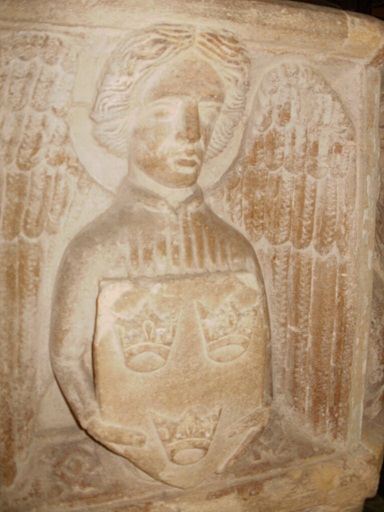|
Alde Valley Academy
Alde Valley Academy is a secondary school with academy status in Leiston in the English county of Suffolk. It has approximately 500 pupils aged 11 to 16, and a staff count of approximately 82. It draws pupils from the surrounding coastal area, including the towns of Leiston, Aldeburgh and Saxmundham Saxmundham ( ) is a market town in Suffolk, England, set in the valley of the River Fromus about north-east of Ipswich and west of the coast at Sizewell. The town is bypassed by the main A12 road between London and Lowestoft. The town is serv .... The academy was previously known as Leiston Community High School and was, for many years a 13 to 18 school. In September 2012, as part of reorganisation of high school education in Suffolk, the school became an 11 to 18 school and rebranded itself as Alde Valley School, a name chosen to reflect its large and rural catchment area.Potter.T (2012Leiston: Pupils take first lessons in new-look high school ''East Anglian Daily Times'', 6 ... [...More Info...] [...Related Items...] OR: [Wikipedia] [Google] [Baidu] |
Academy (English School)
An academy school in England is a state-funded school which is directly funded by the Department for Education and independent of local authority control. The terms of the arrangements are set out in individual Academy Funding Agreements. Most academies are secondary schools, though slightly more than 25% of primary schools (4,363 as of December 2017) are academies. Academies are self-governing non-profit charitable trusts and may receive additional support from personal or corporate sponsors, either financially or in kind. Academies are inspected and follow the same rules on admissions, special educational needs and exclusions as other state schools and students sit the same national exams. They have more autonomy with the National Curriculum, but do have to ensure that their curriculum is broad and balanced, and that it includes the core subjects of English, maths and science. They must also teach relationships and sex education, and religious education. They are free ... [...More Info...] [...Related Items...] OR: [Wikipedia] [Google] [Baidu] |
Leiston, Suffolk
Leiston ( ) is an English town in the East Suffolk non-metropolitan district of Suffolk, near Saxmundham and Aldeburgh, about from the North Sea coast, north-east of Ipswich and north-east of London. The town had a population of 5,508 at the 2011 Census. History The 14th-century remains of Leiston Abbey lie north-west of the town.Leiston Abbey English Heritage. Retrieved 30 March 2011. Leiston thrived in the late 19th and early 20th centuries as a manufacturing town, dominated by , owners of Leiston Works, which boasted the world's first flow assembly line, for the manufacture of [...More Info...] [...Related Items...] OR: [Wikipedia] [Google] [Baidu] |
Suffolk County Council
Suffolk County Council is the administrative authority for the county of Suffolk, England. It is run by 75 elected county councillors representing 63 divisions. It is a member of the East of England Local Government Association. History Established in 1974 and initially based at East Suffolk County Hall, the Council relocated to Endeavour House in Ipswich in 2004. In September 2010, the council announced that it would seek to outsource a number of its services, in an attempt to cut its own budget by 30%. Controversy surrounding the then CEO Andrea Hill, some concerning including £122,000 spent on management consultants, featured in the local and national press in 2011; this led to her facing a disciplinary hearing, and subsequently resigning. Structure of the County Council The County Council is led by its CEO Nicola Beach, who has been in this role since May 2018. The Council is split into 5 distinct areas known as directorates. Each directorate has responsibility for a ran ... [...More Info...] [...Related Items...] OR: [Wikipedia] [Google] [Baidu] |
Secondary School
A secondary school describes an institution that provides secondary education and also usually includes the building where this takes place. Some secondary schools provide both '' secondary education, lower secondary education'' (ages 11 to 14) and ''upper secondary education'' (ages 14 to 18), i.e., both levels 2 and 3 of the International Standard Classification of Education, ISCED scale, but these can also be provided in separate schools. In the United States, US, the secondary education system has separate Middle school#United States, middle schools and High school in the United States, high schools. In the United Kingdom, UK, most state schools and Independent school, privately-funded schools accommodate pupils between the ages of 11–16 or 11–18; some UK Independent school, private schools, i.e. Public school (United Kingdom), public schools, admit pupils between the ages of 13 and 18. Secondary schools follow on from primary school, primary schools and prepare for voc ... [...More Info...] [...Related Items...] OR: [Wikipedia] [Google] [Baidu] |
Leiston
Leiston ( ) is an English town in the East Suffolk non-metropolitan district of Suffolk, near Saxmundham and Aldeburgh, about from the North Sea coast, north-east of Ipswich and north-east of London. The town had a population of 5,508 at the 2011 Census. History The 14th-century remains of Leiston Abbey lie north-west of the town.Leiston Abbey English Heritage. Retrieved 30 March 2011. Leiston thrived in the late 19th and early 20th centuries as a manufacturing town, dominated by , owners of Leiston Works, which boasted the world's first flow assembly line, for the manufacture of |
Suffolk
Suffolk () is a ceremonial county of England in East Anglia. It borders Norfolk to the north, Cambridgeshire to the west and Essex to the south; the North Sea lies to the east. The county town is Ipswich; other important towns include Lowestoft, Bury St Edmunds, Newmarket, and Felixstowe which has one of the largest container ports in Europe. The county is low-lying but can be quite hilly, especially towards the west. It is also known for its extensive farming and has largely arable land with the wetlands of the Broads in the north. The Suffolk Coast & Heaths and Dedham Vale are both nationally designated Areas of Outstanding Natural Beauty. History Administration The Anglo-Saxon settlement of Suffolk, and East Anglia generally, occurred on a large scale, possibly following a period of depopulation by the previous inhabitants, the Romanised descendants of the Iceni. By the fifth century, they had established control of the region. The Anglo-Saxon inhabitants later b ... [...More Info...] [...Related Items...] OR: [Wikipedia] [Google] [Baidu] |
Aldeburgh
Aldeburgh ( ) is a coastal town in the English county, county of Suffolk, England. Located to the north of the River Alde. Its estimated population was 2,276 in 2019. It was home to the composer Benjamin Britten and remains the centre of the international Aldeburgh Festival of arts at nearby Snape Maltings, which was founded by Britten in 1948.Aldeburgh Town Council Retrieved 9 January 2016.Archives Hub Retrieved 7 March 2019. It also hosts an annual poetry festival and several food festivals and other events. Aldeburgh, as a port, gained borough status in 1529 under Henry VIII. Its historic buildings include a 16th-centu ... [...More Info...] [...Related Items...] OR: [Wikipedia] [Google] [Baidu] |
Saxmundham
Saxmundham ( ) is a market town in Suffolk, England, set in the valley of the River Fromus about north-east of Ipswich and west of the coast at Sizewell. The town is bypassed by the main A12 road between London and Lowestoft. The town is served by Saxmundham railway station on the East Suffolk Line between Ipswich and Lowestoft. Governance Saxmundham Town Council comes under East Suffolk District. It was previously in Suffolk Coastal District before April 2019. The district electoral ward also has the name Saxmundham. Its population at the 2011 census was 4,913. As of December 2022, Saxmundham Town Council consisted of ten councillors. Heritage The place-name Saxmundham is first attested in the Domesday Book of 1086 as ''Sasmunde(s)ham''. It appears as ''Saxmundham'' in the Feet of Fines of 1213. The name denotes "Seaxmund's village or estate". The Parish Church of St John the Baptist dates back to the 11th century. Some features remain from the medieval period, but ... [...More Info...] [...Related Items...] OR: [Wikipedia] [Google] [Baidu] |
Secondary Schools In Suffolk
Secondary may refer to: Science and nature * Secondary emission, of particles ** Secondary electrons, electrons generated as ionization products * The secondary winding, or the electrical or electronic circuit connected to the secondary winding in a transformer * Secondary (chemistry), a term used in organic chemistry to classify various types of compounds * Secondary color, color made from mixing primary colors * Secondary mirror, second mirror element/focusing surface in a reflecting telescope * Secondary craters, often called "secondaries" * Secondary consumer, in ecology * An obsolete name for the Mesozoic in geosciences * Secondary feathers, flight feathers attached to the ulna on the wings of birds Society and culture * Secondary (football), a position in American football and Canadian football * Secondary dominant in music * Secondary education, education which typically takes place after six years of primary education ** Secondary school, the type of school at the s ... [...More Info...] [...Related Items...] OR: [Wikipedia] [Google] [Baidu] |
Academies In Suffolk
An academy ( Attic Greek: Ἀκαδήμεια; Koine Greek Ἀκαδημία) is an institution of secondary or tertiary higher learning (and generally also research or honorary membership). The name traces back to Plato's school of philosophy, founded approximately 385 BC at Akademia, a sanctuary of Athena, the goddess of wisdom and skill, north of Athens, Greece. Etymology The word comes from the ''Academy'' in ancient Greece, which derives from the Athenian hero, '' Akademos''. Outside the city walls of Athens, the gymnasium was made famous by Plato as a center of learning. The sacred space, dedicated to the goddess of wisdom, Athena, had formerly been an olive grove, hence the expression "the groves of Academe". In these gardens, the philosopher Plato conversed with followers. Plato developed his sessions into a method of teaching philosophy and in 387 BC, established what is known today as the Old Academy. By extension, ''academia'' has come to mean the accumulatio ... [...More Info...] [...Related Items...] OR: [Wikipedia] [Google] [Baidu] |




